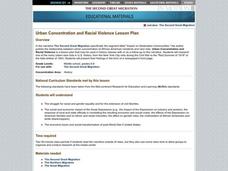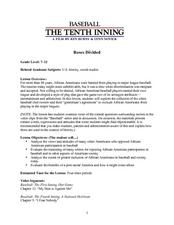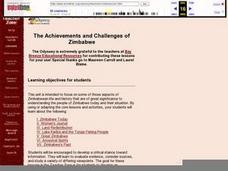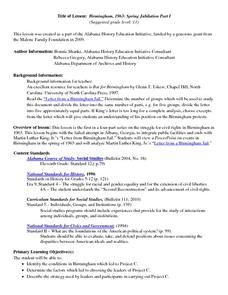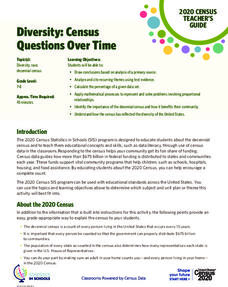Curated OER
Racial Profiling
Students explore racial profiling. In this Teaching Tolerance lesson plan, students discover what racial profiling is and then teach their classmates what it is as they write a news report or opinion essay. Students may also create a...
Curated OER
Land and Liberty: The Saga of Sam McCulloch
The struggles of Sam McCulloch, a free black man, to be recognized as a citizen entitled to own land in Texas are the focus of research project that ask groups to examine a series of primary source documents and piece together...
Curated OER
Responses to Racially Imbalanced Schools
Students explore the implications of segregation. In this Civil Rights lesson, students investigate what equal education is as they discover the state of Boston schools in 1960. Students define civil rights and discrimination as they...
Alabama Department of Archives and History
Two Different African-American Visions: W.E.B. Du Bois and Booker T. Washington
The strategies civil rights activists Booker T. Washington and W.E.B. Du Bois proposed for blacks to achieve racial progress is the focus of an activity in which class groups identify the strategies as well as the benefits and drawbacks...
PBS
Ken Burns: Jackie Robinson Taking the Measure of a Man
During his first few games as the first black player in Major League Baseball, Jackie Robinson proved that he could withstand the wily curveball of Johnny Sain as well as the racial epithets shouted from opposing teams' dugouts. A short...
Teaching Tolerance
Using Photographs to Teach Social Justice | Confronting Unjust Practices
A powerful photograph of the Freedom Riders of 1961 launches an examination of the de jure and de facto injustices that the civil rights movement of the 1950s and 1960s addressed. Young historians first watch a video and read the Supreme...
EngageNY
Studying Conflicting Interpretations: Perspectives on Plessy v. Ferguson: Part 3
Scholars closely read Justice John Marshall Harlan's dissenting opinion in the Plessy v. Ferguson case, seeking to understand why he disagreed with the court's decision that racial segregation laws for public spaces were constitutional....
Curated OER
Urban Concentration And Racial Violence
Middle schoolers investigate the struggle for racial and gender equality and for the extension of civil liberties, the social and economic impact of the Great Depression, and the economic boom and social transformation of post-World War...
Curated OER
FBI Counts Mosques
Students research the term "racial profiling to help decide if this directive fits in that category. Students explore the reaction of each side and the pros and cons each offers. Students Prepare a debate with one side supporting the FBI...
PBS
Baseball: The Tenth Inning - Bases Divided
Baseball is a relatively high-interest topic through which social studies classes can explore racial prejudice in the US. Video clips provide much of the background information that groups record on their handout and then share with the...
Film Education
Gone with the Wind Study Guide
The 1939 Oscar-winning Gone with the Wind, is the focus of an informational packet designed to be used with a viewing of the film. As part of their analysis, media students respond to a series of discussion points about the influence of...
Curated OER
The Achievements and Challenges of Zimbabwe
Here is an excellent set of five short lessons and activities intended to help learners not only gain an understand of current issues in Africa, but build critical thinking, synthesis, analysis, expository writing, research, and...
Curated OER
Looking Into the Mirror
Young scholars survey the impact of racial, cultural, and/or socio-economic intolerance in their own lives in relation to other individuals. They develop written and oral proposals to solve inequality and intolerance on a local, state,...
State Bar of Texas
Grutter v. Bollinger
A university decides not to allow a qualified scholar to enter its institution based on skin and gender—but this case is about a white female? The 2003 Supreme Court case Grutter v. Bollinger lays the foundation for open discussion and...
Curated OER
Should the U.S. Say Sorry?
Eighth graders research "reparations," by examineing the institution of slavery, racial and economic discrimination against African-Americans, and the impact of these forces on living African-Americans, to make recommendations to the...
Alabama Department of Archives and History
What Were They Thinking? Why Some Some Alabamians Opposed the 19th Amendment
To better understand the debate over the 19th Amendment, class members examine two primary source documents that reveal some of the social, economic, racial, and political realities of the time period.
Alabama Department of Archives and History
Birmingham, 1963: Spring Jubilation Part 2
The release of Martin Luther King, Jr. from the Birmingham jail, the Children's March, and the bombings of the Gaston Motel and the home of Reverend A.D. King's home. As part of a study of the civil rights movement, class members...
Alabama Department of Archives and History
Birmingham 1963: Spring Jubilation Part 1
As part of a study of the 1963 quest for civil rights in Birmingham, Alabama, class members view a PowerPoint that details the struggle and analyze Martin Luther King, Jr.'s "Letter from a Birmingham Jail."
North Carolina Consortium for Middle East Studies
Missing Pieces of the Puzzle: African Americans in Revolutionary Times
What's missing from most studies of the American Revolutionary War is information about the role African Americans played in the conflict. To correct this oversight, middle schoolers research groups like the Black Loyalists and Black...
Stanford University
Letter from Birmingham Jail: The Power of Nonviolent Direct Action
What strategies are most effective in changing an unjust law? Class members examine the tactics used in the Birmingham Campaign of 1963 (Project C) to achieve social justice and social transformation. After examining documents that...
Facing History and Ourselves
The Nazis in Power: Propaganda and Conformity
The Nazis used the power of propaganda to encourage confirmative views and the discrimination of Jews. A social studies resource illustrates these issues through discussion, image analysis, and a writing exercise.
Curated OER
World War II - The Holocaust
The Holocaust is the focus of this world history PowerPoint. Viewers are presented with important facts regarding the Holocaust, and the rise of Nazi Germany. They must answer questions such as: "Describe Nazi anti-Semitism in the...
US National Archives
Documented Rights Educational Lesson Plan
How have groups struggled to have their unalienable rights recognized in the United States? Acting as a research team for the Human Rights Council of the United Nations, your young historians will break into groups to research how people...
US Department of Commerce
Diversity: Census Questions Over Time
The story of race in the United States continues to evolve, and the numbers show it. Using data from the last two census counts, learners consider recent demographic shifts. They then analyze the information to hypothesize: What could...









